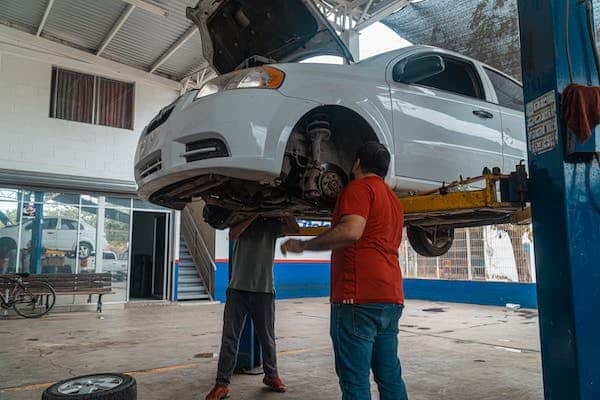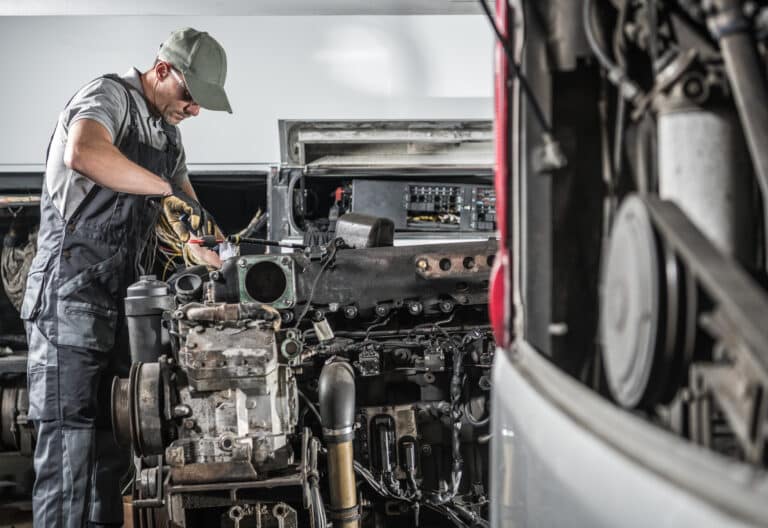Diesel mechanics are technicians that inspect, identify, repair, and maintain automobiles with diesel engines. Their day-to-day tasks generally range from changing oils or tires to replacing defective components or repairing diesel engines.
Diesel mechanics is a profession that is gaining more and more popularity, and the demand for diesel technicians has been increasing recently. According to the U.S. Bureau of Labor Statistics, diesel mechanic jobs will rise by 4% by the year 2031
If you’re interested in pursuing a career in this field, you will be relieved to know that becoming a diesel mechanic is fairly easy. The only minimum requirement is to complete your high school diploma or a GED and then enroll yourself in a diesel mechanic training program.
Completing a training program is required for diesel mechanics as it teaches you about different specialized tools and diesel engines.

There are three main ways in which you can get your diesel mechanic training, such as-
- Getting an associate’s diesel mechanic degree from a university
- Enrolling in certification programs offered by trade schools and community colleges
- Completing online training programs (most recommended)
Let us further dive into each of these options and discover their pros and cons, and help you decide which type of training is the best suited for you.
Associate’s Degree
Duration- 2 years
Cost- $30,000 to $50,000
Associate’s degrees are usually offered by universities, and they provide diesel mechanics aspirants with industry knowledge and skills. What they learn in a diesel mechanic school powers them with the skills they need to repair engines.
Pros of getting an associate’s degree
- A popular option, you get a degree in diesel mechanics that increases your job prospects
- Offers additional general education classes that will help you become an all-rounder candidate.
- You get a university certificate which is considered best for your resume.
Even though the pros of choosing an associate’s degree are highly advantageous, there are several cons that stop most candidates from opting for this degree.
Cons of getting an associate degree
- Significantly higher tuition costs– An average associate’s degree costs around $30,000 to $50,000, which ultimately leads to students having to take on educational loans.
- Duration of course– An associate’s degree typically lasts for two years, which means that students have to fully focus on completing their degree, with little to no scope left to pursue any side jobs or hobbies on the side.
- Additional Costs– Getting an associate’s degree also means you will need to travel to and from classes every other day, which includes extra expenses such as travel costs, apart from other living expenses if you move to a new city to pursue such a course.
Certification Programs
Duration- 1 year
Cost- $5,000 to $10,000
Certification programs for diesel mechanics are usually offered by trade schools or community colleges, and these courses focus on imparting the relevant knowledge and skills for diesel mechanics to handle their responsibilities efficiently.
Certification programs usually also provide hands-on training experience to equip aspirants with specialized tools or machinery.
Let’s look at the pros of choosing a certification program for your diesel mechanic training.
Pros of Certification Programs
- Lesser tuition costs– As compared to an associate’s degree, a certification program costs significantly lesser, about $5,000 to $10,000.
- Lesser duration of the course– A certification program can be completed within a year. This means you can start your career faster and be ready to crush the diesel mechanic certifications.
Now let’s see the cons of choosing a certification program.
Cons of Certification Programs
- Scheduled classes- Even though a certification program has a shorter duration than an associate’s degree, it does not offer much flexibility.
Students have to attend scheduled classes set by the school, and in case they miss any classes, it is very difficult to reschedule them. - Unaccredited Programs – It is always recommended to check well in advance if the certification program you’re opting for is accredited and recognized by the legal authorities.

Online Training Programs
Duration- 6 to 12 months
Cost- $5,000
Choosing online training programs are considered to be the best and are highly recommended for aspiring diesel mechanics. T
his is because of the several advantages online programs offer as compared to an associate’s degree or certification program.
Here is why opting for online programs is the best option for you-
Pros of an Online Diesel Mechanic Training Program
- Significantly lower tuition costs– As compared to an associate’s degree or a certification program, online programs usually cost only around $5,000.
The low cost makes it the best option for aspiring students who don’t want the burden of student debt. - Faster completion of the course– When you choose an online training program, you have the option of completing your course in as little as 6 months, which makes getting certified as a diesel mechanic and starting your career much faster than other options.
- Offers flexibility– Online programs allow you to learn at your own pace and schedule and from the comfort of your own home.
- Offers externship opportunities– Some accredited online programs offer you an externship opportunity after you have completed their course, which helps you gain hands-on training and experience working with diesel engine machinery.
Next Steps after Completing Your Education
Although the diesel mechanic training requirements vary from employer to employer, there are majorly three ways of getting training for this profession.
Also, every technician has a different route to follow to reach the pinnacle, however, diesel mechanics follow a certain path to become one. These are as follows:
Get Your CDL
The next step in becoming a diesel technician is to get your CDL or a Commercial Driver’ License. This will make you gain a legal license to operate heavy machinery. It is required to get your CDL after you complete your training and before you sit for your certification exams.
Become ASE Certified
After you complete your training and get a CDL, you will need to sit for your certification exam. For diesel mechanics, the main certification exams are conducted by ASE.
Beginners can go for the G1 Certification exam and get certified. This certification is highly preferred by employers. As you gain experience, it is recommended that you clear and get as many ASE certifications as certs build trust in the eyes of the employer.

Look for externships
Not all online programs offer an externship opportunity. Getting an externship is considered to be vital for diesel mechanics, as they offer you the appropriate hands-on training and skills that you would need to fulfill everyday tasks within the workshop.
Externships also assist you in attaining industry experience and a chance for more practical knowledge.
Apply for Jobs
The final step is to make your resume impressive by honing all the relevant skills you would need as a diesel mechanic and finally applying for all your shortlisted companies and workshops. Alternatively, you can also apply for Diesel Mechanic Apprenticeship.
How Long is Diesel Mechanic School?
The duration of diesel mechanic school ranges from 6 months up to 2 years. An online diesel mechanic program is generally 6 months long.
Is Diesel Mechanic School Hard?
At first glance, diesel mechanic training and schooling might seem intimidating. However, it is not really hard to become a diesel mechanic. As long as you stay consistent with your training and education, you will be able to overcome any hurdles that might come your way.

Gaining the right hands-on experience with tools and machinery is vital. Apart from that, basic math and computer skills are also important for diesel techs.
Ultimately, picking the right type of diesel mechanic training is essential for you to gain the relevant skills and knowledge.
Is Diesel Mechanic School Worth It?
Every single person comes with a unique background, life experiences, culture, and interests. Hence, it is important to carefully consider the pros and cons of entering any industry and whether it is best suited for you.
Attending diesel mechanic school comes with its own set of advantages and disadvantages. What works for one person might not work for the other.
The main disadvantages attached to attending a diesel mechanic school are the extremely high costs and the duration of the course. Diesel mechanics school are usually very expensive, cannot be completed before two years, and offers little to no flexibility in classes.
Aspiring candidates that wish to start their careers as soon as possible should consider opting for online training programs. Plus, choosing online training programs will also save you from taking on student loans.
Also, it is important to note that the average diesel technician salary is close to $50,000 per year. This is a big reason why students go for this career.
Conclusion
A career in diesel mechanics has been gaining popularity as of late. According to the BLS, the job outlook for diesel mechanics also looks fairly positive, with a substantial increase in employment rates in the coming years.
If you wish to step into this highly rewarding career, choosing the right type of training would be your best bet.
Additional Resources for Diesel Techs
What is a Diesel Mechanic
How to Become a diesel mechanic
Diesel mechanic tools
Mobile Diesel Mechanic
Heavy Duty Diesel Mechanic
Marine Diesel Mechanic
Diesel Mechanic Job Description
Diesel Mechanic Requirements
Diesel Mechanic Resume




